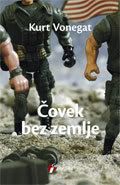By CRISTIAN SALAZAR, Associated Press Writer
NEW YORK - Kurt Vonnegut, the satirical novelist who captured the absurdity of war and questioned the advances of science in darkly humorous works such as "Slaughterhouse-Five" and "Cat's Cradle," died Wednesday. He was 84.
Vonnegut, who often marveled that he had lived so long despite his lifelong smoking habit, had suffered brain injuries after a fall at his Manhattan home weeks ago, said his wife, photographer Jill Krementz.
The author of at least 19 novels, many of them best-sellers, as well as dozens of short stories, essays and plays, Vonnegut relished the role of a social critic. Indianapolis, his hometown, declared 2007 as "The Year of Vonnegut" — an announcement he said left him "thunderstruck."
He lectured regularly, exhorting audiences to think for themselves and delighting in barbed commentary against the institutions he felt were dehumanizing people.
"I will say anything to be funny, often in the most horrible situations," Vonnegut, whose watery, heavy-lidded eyes and unruly hair made him seem to be in existential pain, once told a gathering of psychiatrists.
A self-described religious skeptic and freethinking humanist, Vonnegut used protagonists such as Billy Pilgrim and Eliot Rosewater as transparent vehicles for his points of view. He also filled his novels with satirical commentary and even drawings that were only loosely connected to the plot. In "Slaughterhouse-Five," he drew a headstone with the epitaph: "Everything was beautiful, and nothing hurt."
---------------------------------------------------------------------------------
Čovek bez zemlje
Kurt Vonegat
Sva je sreća što je Kurt Vonegat prekršio obećanje da više neće pisati. Evo nove knjige ove žive američke ikone još uvek oštrog i vrcavog uma i u osamdeset i četvrtoj godini. Ovi mini-memoari sastoje se od humanih poruka čoveka kome je drskost i neprećutkivanje dozvoljeno upravo zbog duboke starosti koja se može podičiti i lucidnošću i mudrošću. U njima ćemo saznati kako je nastala čuvena Klanica Pet, ali ponešto i o Pepeljugi, Hamletu i podosta o Džordžu Bušu. Vonegat je svoja sećanja iz prošlosti i iz sadašnjice napisao izuzetno duhovito, brinući jednako o ekološkoj budućnosti planete i hranljivosti humora, o politici, ratu, umetnosti i duši današnje Amerike. Iako veoma kritična, dovoljno gorka, ponekad i brutalna, ova sećanja su ujedno i nežna oda pisanju i sreći.
Vladislav Bajac
„Vonegatov Čovek bez zemlje je čisti Mark Tven: mračno duhovit, gnevan na korupciju i pohlepu, prepun saosećanja prema nemoćnima. Nikada nam nije bio potrebniji.“
Rasel Benks
Autor crteža u knjizi je Kurt Vonegat.

Kurt Vonegat
Kurt Vonegat je rođen 1922. godine u Indijanopolisu. Ubraja se u probrane velikane američke književnosti, i bez njega bi i sam pojam američke književnosti bio znatno osiromašen. Do sada je objavio romane: Mehanički pijanino (1952), Sirene s Titana (1959), Majka noć (1962), Kolevka za macu (1963), Bog vas blagoslovio, gospodine Rouzvoter (1965), Klanica Pet (1969), Doručak šampiona (1973), Lakrdija (1976), Zatvorska ptičica (1979), Snajper Dik (1982), Galapagos (1985), Plavi drozd (1988), Hokus-pokus (1990), Vremenski potres (1996); zbirke kratkih priča: Kanarinac u mačijem leglu (1961), Dobrodošli u majmunarnik (1968), Bogombova burmutica (1999); knjige eseja: Vampeters, Fuma i Grenfelons (1974), Cvetna nedelja (1981), Sudbine gore od smrti (1990), Bog vas blagoslovio, dr Kevorkiane (2001), Čovek bez zemlje (2005); drame: Srećan rođendan, Vanda Džun (1970), Između vremena i Timbuktua (1972), Odluči se (1993) i druge.



